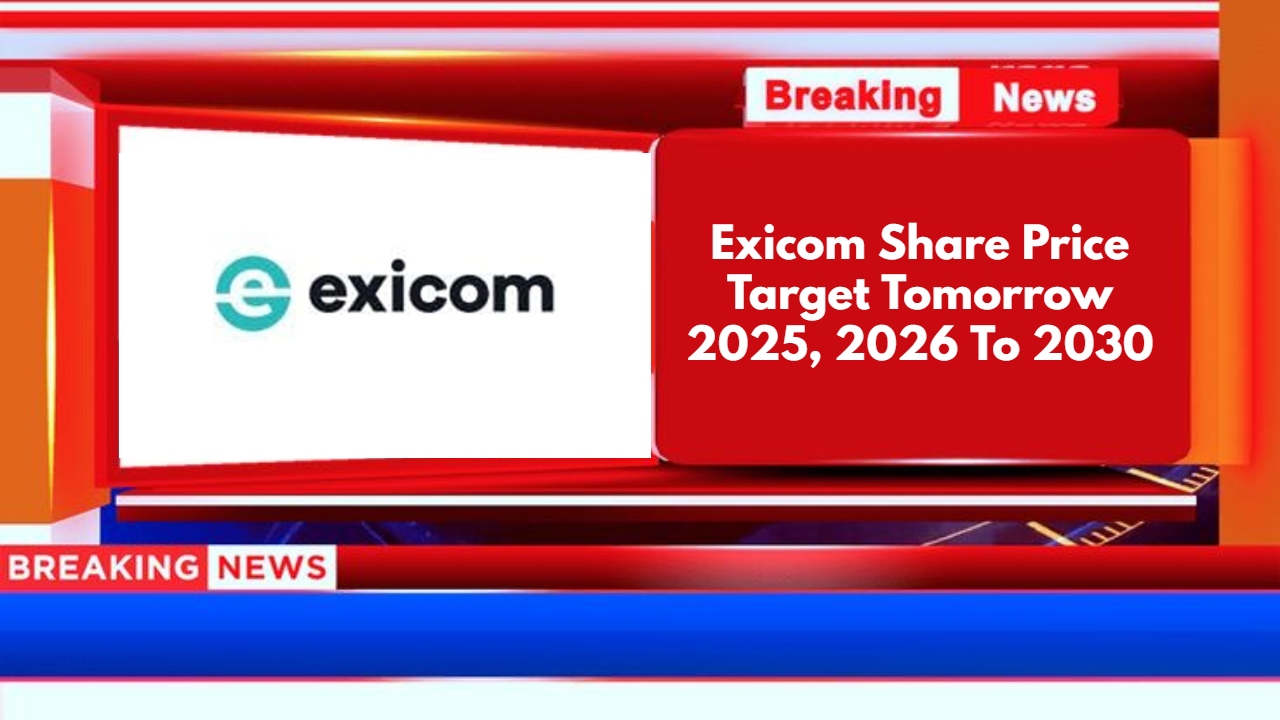Exicom is emerging as a strong player in India’s fast-growing electric vehicle (EV) charging industry. With the rising demand for EVs and government support for clean energy, Exicom is well-positioned for future growth. Investors are keen to know how the company’s stock might perform in the coming years. Exicom Share Price on 8 March 2025 is 155.97 INR. This article will provide more details on Exicom Share Price Target 2025, 2026 to 2030.
Exicom Company Info
- Founded: 1994
- Headquarters: India
- Number of employees: 789 (2024)
- Parent organization: NextWave Communications Private Limited
- Subsidiaries: Exicom Power Solutions B.V
Exicom Share Price Chart
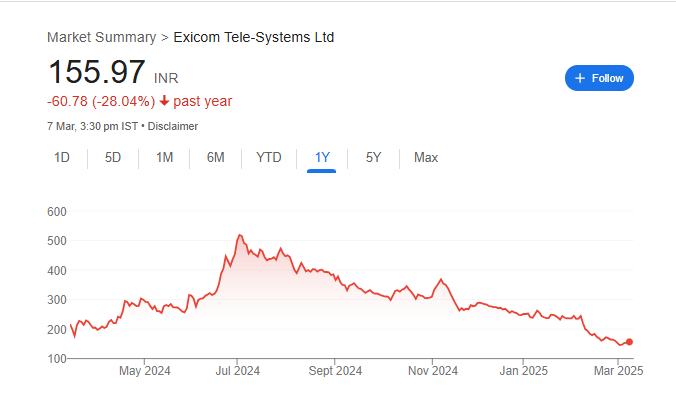
Exicom Share Price Details
- Today Open: 154.00
- Today High: 161.80
- Today Low: 153.10
- Mkt cap: 1.88KCr
- P/E ratio: N/A
- Div yield: N/A
- 52-wk high: 530.00
- 52-wk low: 141.50
Exicom Shareholding Pattern
- Promoters: 69.57%
- Foreign Institutions: 0.73%
- Mutual Funds: 4.43%
- Retails and others: 24.04%
- Domestic Institutions: 1.23%
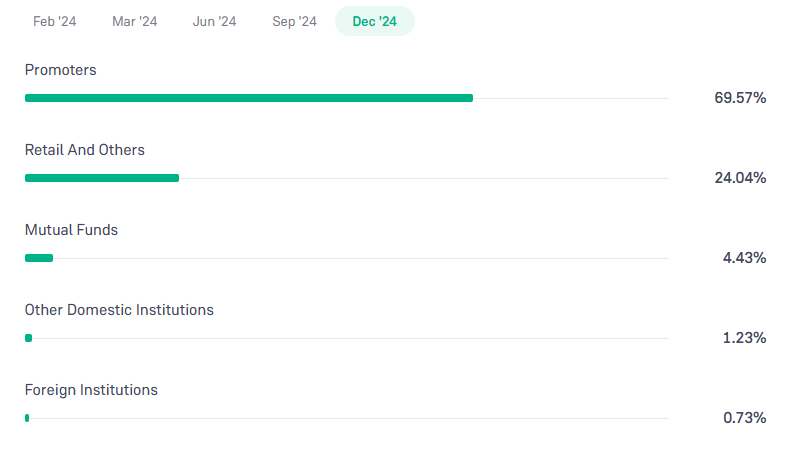
Exicom Share Price Target Tomorrow 2025, 2026 To 2030
- 2025 – ₹530
- 2026 – ₹580
- 2027 – ₹630
- 2028 – ₹680
- 2029 – ₹730
- 2030 – ₹780
Exicom Share Price Target 2025
Exicom share price target 2025 Expected target could be ₹530. Here are 5 Key Factors Affecting Growth for Exicom Share Price Target 2025:
-
Expansion in the EV Charging Market
Exicom’s strategic focus on the electric vehicle (EV) charging sector is pivotal for its growth. The company aims for its EV charger business to contribute 50% of its annual revenue by 2030, up from about 25% in fiscal 2024. This ambition aligns with India’s rapidly growing EV market, which is expanding at an annual rate of 30-50%. -
Technological Advancements and Product Innovation
Exicom’s commitment to innovation is evident in its launch of advanced charging solutions like the Harmony Boost, which integrates solar power, grid input, and intelligent Battery Energy Storage Systems (BESS) to deliver high-power EV charging. Such technological advancements position Exicom to meet the increasing demand for efficient and sustainable charging infrastructure. -
Strategic Acquisitions and Global Expansion
The acquisition of Tritium, an Australian EV charging company, signifies Exicom’s intent to enhance its global footprint. This move opens up a $10 billion addressable market and is central to Exicom’s global expansion strategy, potentially driving significant business growth. -
Manufacturing Capacity Enhancement
To support its growth ambitions, Exicom is expanding its manufacturing capabilities with a new facility in Hyderabad. This plant will more than double the company’s production capacity, enabling it to meet the anticipated increase in demand for its EV charging products. -
Favorable Government Policies and Market Trends
Supportive government initiatives promoting EV adoption and infrastructure development are likely to benefit Exicom. The unveiling of 26 new EV models at the Bharat Mobility Global Expo in January 2025 reflects a strong market outlook, positioning Exicom to capitalize on the growing demand for EV charging solutions.
Exicom Share Price Target 2030
Exicom share price target 2030 Expected target could be ₹780. Here are 5 Risks and Challenges for Exicom Share Price Target 2030:
-
Intense Market Competition
The EV charging industry is rapidly evolving, with major global and domestic players investing heavily in technology and expansion. Exicom faces strong competition from companies like Tata Power, ABB, Delta Electronics, and Tesla, which could impact its market share and pricing power. -
Dependence on Government Policies and Incentives
Exicom’s growth is closely tied to government policies supporting EV adoption and charging infrastructure. Any changes or reductions in subsidies, incentives, or regulatory shifts could slow down the expansion of the EV sector, affecting Exicom’s revenue growth. -
Technological Disruptions and Innovation Challenges
The EV charging market is highly dynamic, with continuous advancements in battery technology, wireless charging, and ultra-fast charging solutions. If Exicom fails to keep up with innovations, it risks losing relevance to more advanced competitors. -
Supply Chain and Raw Material Risks
The company relies on key electronic components and raw materials for manufacturing EV chargers and energy storage systems. Disruptions in the supply chain, rising raw material costs, or geopolitical issues affecting imports could negatively impact production and profitability. -
Profitability and High Capital Investments
While Exicom is expanding its manufacturing capabilities and global footprint, the EV charging business requires significant capital investment. If revenue growth does not match investment levels, or if profitability remains under pressure due to high competition and operational costs, it may affect long-term shareholder returns.
Financials Statement Of Exicom
| (INR) | 2024 | Y/Y change |
| Revenue | 10.26B | 44.03% |
| Operating expense | 1.75B | 36.75% |
| Net income | 639.16M | 697.51% |
| Net profit margin | 6.23 | 451.33% |
| Earnings per share | — | — |
| EBITDA | 1.13B | 89.43% |
| Effective tax rate | 31.43% | — |
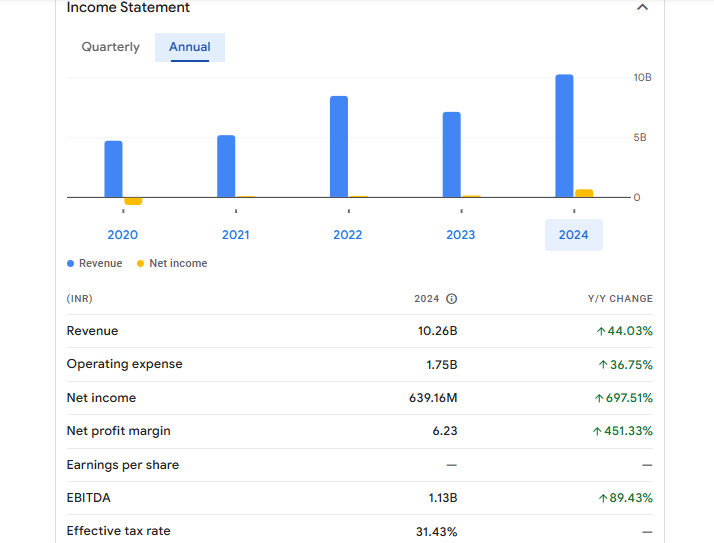
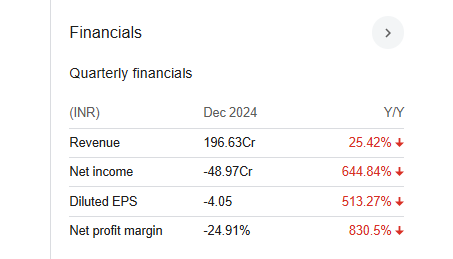
Read Also:- South Indian Bank Share Price Target Tomorrow 2025, 2026 To 2030

